
Toshiba HG6 SSD 512GB Review
Manufacturer: ToshibaUK: £272.40 (inc VAT)
US: $410.00 (ex Tax)
While Toshiba now has a strong presence within the consumer SSD space thanks to its acquisition of the OCZ brand and assets, it still continues to sell SSDs under its own name. After all, it's one of the few companies that actually manufactures its own NAND.
With that in mind, today we're looking at the new HG6 series of SSDs, specifically the top of the line 512GB version (its friends call it THNSNJ512GCSU for short), though Toshiba will also have 60GB, 128GB and 256GB flavours available. All capacities will be sold in 7mm and 9.5mm 2.5-inch casings, as well as mSATA and double-sided M.2 2280 (SATA interface) form factors, with the 128GB and 256GB also having single-sided M.2 2280 versions.
As our drive was shipped straight from the factory, we can't comment on the retail packaging or aesthetics, but the drive is enclosed in a plain and solid metal case. There's room for a branding sticker (as shown above) but it's not an exciting to product to look at by any means.
According to press materials, the HG6 SSDs are designed for use in notebooks, workstations, read intensive enterprise applications and server boot drives. From these last three categories we would therefore expect high performance in intensive mixed workloads and with high queue depth random reads. However, Toshiba only provides sequential performance figures, and only for the 512GB drive. These are 534MB/sec for reads and 482MB/sec for writes.
The HG6 SSDs are Toshiba's first mainstream drives to use its new A19nm (Advanced 19nm) Toggle 2.0 MLC NAND, which the company claims brings improvements to both performance and power efficiency. We actually saw this NAND at Computex 2014 – it's the same as will be used by OCZ in its upcoming Vector 180 range. The Vector line of drives is a high performance line, especially when it comes to multi-tasking and high queue-depths, so again we're hopeful that the HG6 drives can deliver in these areas.
Toshiba has neglected to provide any details of the NAND endurance, which is annoying, but we do have (some) warranty information – the HG6 SSDs have a three year warranty in the US and Canada. We're working on finding out EU warranty information as well, as unlike most SSD manufacturers Toshiba varies its warrany by region.
In terms of features, the HG6 SSD range has one called Adaptive Size SLC Write Cache technology. Few details are available on this, but it seems logical to assume that it functions similarly to Samsung's TurboWrite, treating a portion of the NAND as SLC for write operations to improve performance before flushing the writes to the MLC when idle. Sadly, no details have been provided about how much of the NAND can be allocated in this way or how the cache functions. Another feature is called Quadruple Swing-By Code, an algorithm for improved error correction and reliability.
The HG6 series SSDs are compliant with the TCG Opal 2.0 standards of encryption, enabling on the fly hardware level encryption through tools such as Microsoft's BitLocker.
Given that this is a 512GB SSD, we were surprised to learn that components are fitted to one side of the PCB only. There are eight NAND packages – presumably there is 64GB in each one formed from four 128Gbit dies, but again details are scarce here so we can't be certain. The controller is one of Toshiba's own design, the TC358790XBG, and it doesn't appear to be paired with any separate cache.
Unusually, there are thermal pads placed on every NAND package as well as the controller, perhaps further indicative of Toshiba's intention for the HG6 series to be used in intensive workload environments such as workstations and servers.
Specifications
Interface: SATA 6GbpsNominal capacity: 512GB
Formatted capacity: 476.94GB
Controller: Toshiba TC358790XBG
Cache: Not stated
Memory type/amount: Toshiba A19nm Toggle 2.0 MLC NAND dies (8 x 64GB packages)
Endurance rating: Not stated
Warranty: Three years (US/Canada); variable (worldwide)

MSI MPG Velox 100R Chassis Review
October 14 2021 | 15:04

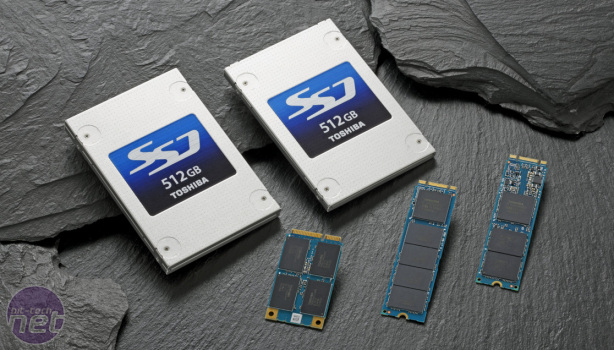
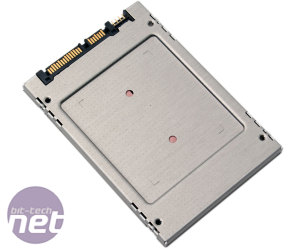
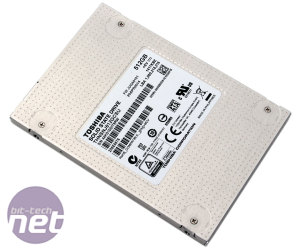
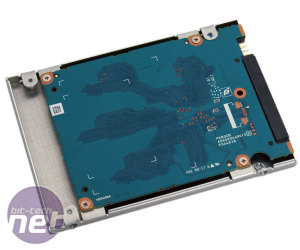
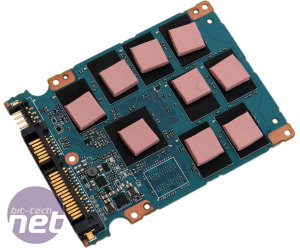
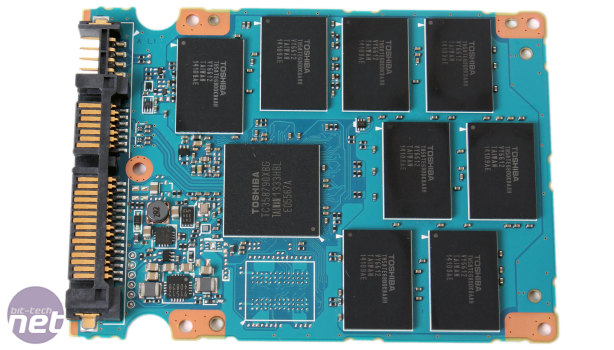







Want to comment? Please log in.